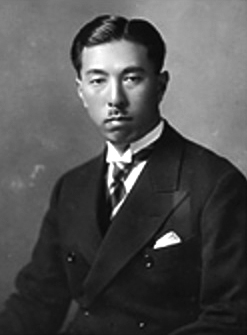Fumimaro Konoe
Fumimaro Konoe (often Konoye, 12 October 1891 – 16 December 1945) was a Japanese politician, statesman, and Prime Minister of Japan who played a key role in the political landscape of Japan during the Second Sino-Japanese War and the early years of World War II. Konoe was born into an aristocratic family with strong ties to the Japanese imperial family, which facilitated his rise in the political arena of Japan.
Early Life and Education[edit | edit source]
Fumimaro Konoe was born into the ancient Fujiwara clan, one of the most prestigious aristocratic families in Japan. He was educated at the Peers' School (Gakushūin) and later at the University of Tokyo, where he specialized in political science. Konoe's early life was marked by his elite status and connections, which would later influence his political career.
Political Career[edit | edit source]
Konoe's political career began in the 1920s. He was first elected to the House of Peers due to his aristocratic status. His political views were initially moderate, advocating for parliamentary government and social reforms. However, as Japan's political climate shifted towards militarism and ultranationalism in the 1930s, Konoe's stance also changed.
In 1937, Konoe was appointed as the Prime Minister of Japan, a position he would hold three times until 1941. His tenure as prime minister was marked by significant events, including the deepening of the Second Sino-Japanese War and the beginning of Japan's involvement in World War II. Konoe was a proponent of the New Order in East Asia, aiming to establish a bloc led by Japan, free from Western influence.
Role in World War II[edit | edit source]
As Prime Minister, Konoe played a crucial role in Japan's foreign policy and its decisions leading up to and during World War II. He was a key figure in the decision to sign the Tripartite Pact with Nazi Germany and Fascist Italy, aligning Japan with the Axis powers. Konoe's government also saw the escalation of the conflict in China and the spread of the war to Southeast Asia and the Pacific.
Despite his initial aggressive policies, Konoe later advocated for peace negotiations with the United States in 1941, realizing the potential consequences of a prolonged war. However, his efforts were unsuccessful, and he resigned in October 1941, just two months before the Attack on Pearl Harbor.
Later Life and Death[edit | edit source]
After resigning as Prime Minister, Konoe remained influential in political circles but was increasingly marginalized as the war continued. Following Japan's defeat in 1945, he was identified as a potential war criminal by the Allied Powers. Faced with the prospect of being tried, Konoe committed suicide by taking poison on 16 December 1945.
Legacy[edit | edit source]
Fumimaro Konoe's legacy is complex. He is remembered both for his efforts to reform Japan's political system and for his role in leading the country into World War II. His tenure illustrates the challenges Japan faced as it navigated between tradition and modernity, peace and expansionism.
Search WikiMD
Ad.Tired of being Overweight? Try W8MD's physician weight loss program.
Semaglutide (Ozempic / Wegovy and Tirzepatide (Mounjaro / Zepbound) available.
Advertise on WikiMD
|
WikiMD's Wellness Encyclopedia |
| Let Food Be Thy Medicine Medicine Thy Food - Hippocrates |
Translate this page: - East Asian
中文,
日本,
한국어,
South Asian
हिन्दी,
தமிழ்,
తెలుగు,
Urdu,
ಕನ್ನಡ,
Southeast Asian
Indonesian,
Vietnamese,
Thai,
မြန်မာဘာသာ,
বাংলা
European
español,
Deutsch,
français,
Greek,
português do Brasil,
polski,
română,
русский,
Nederlands,
norsk,
svenska,
suomi,
Italian
Middle Eastern & African
عربى,
Turkish,
Persian,
Hebrew,
Afrikaans,
isiZulu,
Kiswahili,
Other
Bulgarian,
Hungarian,
Czech,
Swedish,
മലയാളം,
मराठी,
ਪੰਜਾਬੀ,
ગુજરાતી,
Portuguese,
Ukrainian
Medical Disclaimer: WikiMD is not a substitute for professional medical advice. The information on WikiMD is provided as an information resource only, may be incorrect, outdated or misleading, and is not to be used or relied on for any diagnostic or treatment purposes. Please consult your health care provider before making any healthcare decisions or for guidance about a specific medical condition. WikiMD expressly disclaims responsibility, and shall have no liability, for any damages, loss, injury, or liability whatsoever suffered as a result of your reliance on the information contained in this site. By visiting this site you agree to the foregoing terms and conditions, which may from time to time be changed or supplemented by WikiMD. If you do not agree to the foregoing terms and conditions, you should not enter or use this site. See full disclaimer.
Credits:Most images are courtesy of Wikimedia commons, and templates, categories Wikipedia, licensed under CC BY SA or similar.
Contributors: Prab R. Tumpati, MD





